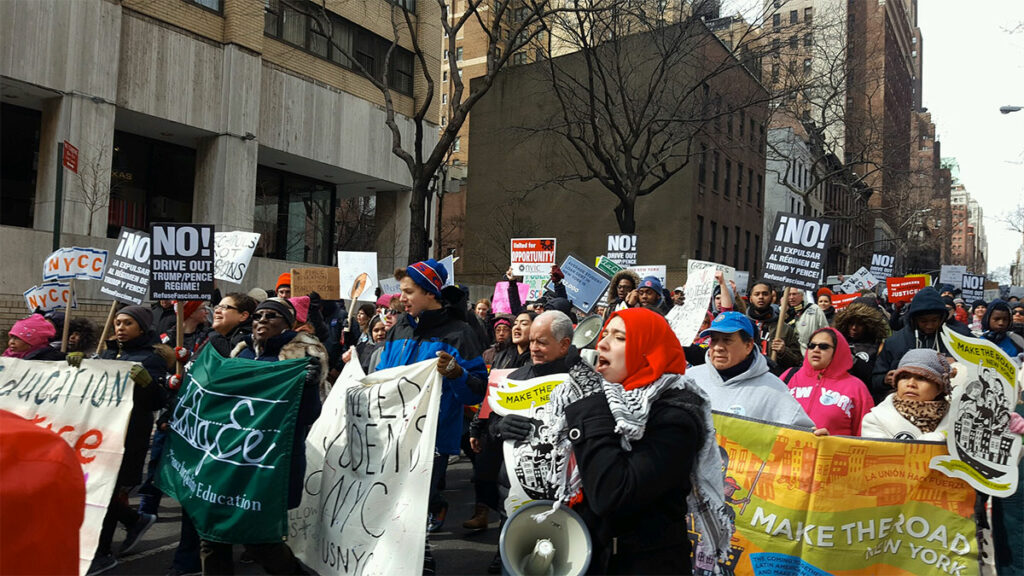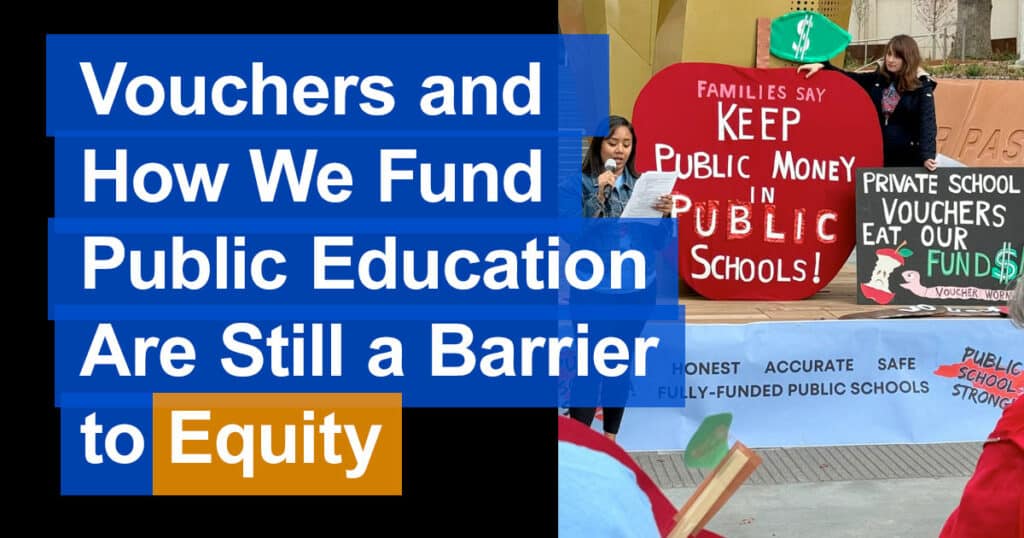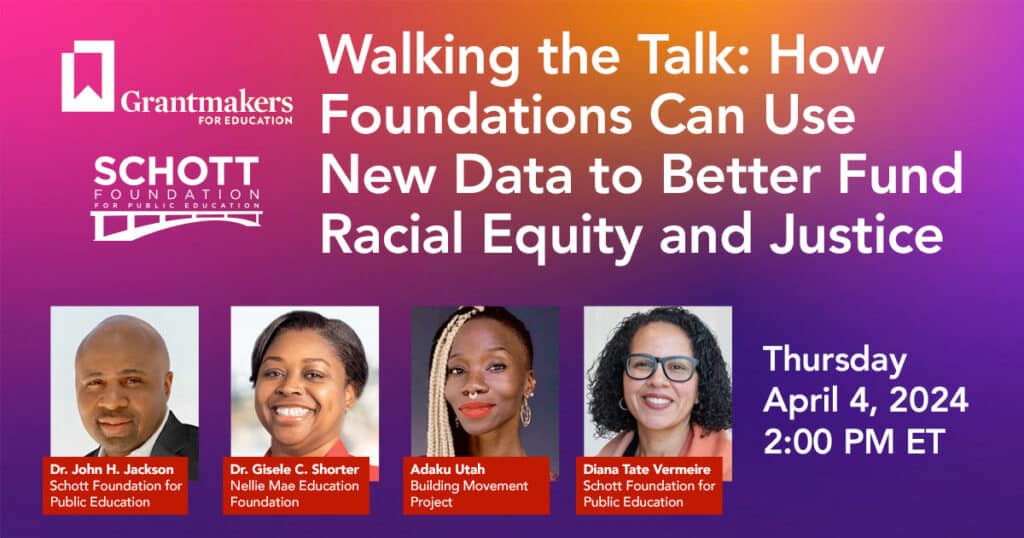Blog
Want some good news? Here are 10 inspiring victories by grantee partners in 2017

In many ways 2017 seemed like a never-ending stream of bad news and attacks on public education. However, advocates kept up the good fight and the movement for education justice saw growth and increased capacity. Thanks to our grantee partners and allies working tirelessly in communities across the country, we’d like to share some good news! In no particular order, here are the top 10 policy wins our grantee partners helped secure. These victories give us hope for 2018 and reinforce the idea that positive change in public education starts at the grassroots.
Want to build on the momentum to advance an opportunity to learn for all students in 2018? Make a donation today!
1. $1 Billion Dollars and More Community Schools in New York
Our grantees in New York, like the Alliance for Quality Education, helped secure a $1 billion increase in school funding (still far less than is needed) and defeated the governor’s proposal to abandon the state’s school aid formula. Learn more about AQE’s inspiring organizing for funding equity.
2. A Limit on Expulsions and Out-of-School Suspensions for K-5 Students in Arkansas
Grantees partners in Arkansas helped pass Act 1059, which reforms the school discipline code by severely curtailing the use of expulsions and out-of-school suspensions for students from kindergarten through fifth grade. Coalition partners in the Arkansas Opportunity to Learn Campaign such as Arkansas Public Policy Panel and Arkansas Advocates for Children and Families have been building momentum for implementing restorative justice in districts across the state.
3. $15 Million in Cuts Restored to Chicago Public Schools
Thanks to public outcry and protest from communities organized by grantee partners like the Journey for Justice Alliance and members of the Generation All campaign, Chicago Public Schools refunded $15 million to schools hardest-hit by their spending freeze, many of which serve low-income Black and Latino neighborhoods.
4. $100 Million Boost to Pennsylvania Schools
The Pennsylvania legislature passed a $100 million increase to the state’s Basic Education Funding. Grantee partners like Education Voters of Pennsylvania were in the trenches, pushing hard to help the commonwealth’s drastically underfunded public education system.
5. More Community Schools in NYC
Thanks to the organizing efforts of parent and community groups like the Coalition for Educational Justice, the community schools model expanded to more than 60 new schools in New York City. Community schools are differ from other public schools, for example they offer an array of wrap-around services to students and their families, from dental check-ups to counseling to job training. Read a recent report about NYC community schools, and learn more about the model at the Coalition for Community Schools.
6. New Orleans Charter Schools Move Away from Zero Tolerance Discipline
Charter schools have been some of the most stubborn institutions when it comes to reforming the traditional punitive model of school discipline. Crocker College Prep, long a “Zero Tolerance” school, this year joined several others in adopting a “trauma-informed” discipline model. But school discipline policies don’t change on their own. Grantees like Families and Friends of Louisiana’s Incarcerated Children (FFLIC) and Kids Rethink New Orleans Schools have for years been putting in the hard work of organizing youth, parents and educators, supported by coalitions like the Dignity in Schools Campaign. FFLIC in particular has worked with four local charter schools to reduce or eliminate suspensions.
7. Massachusetts Fair Share Referendum Passes Last Hurdle Before Vote
Grassroots organizers with the Raise Up Massachusetts coalition helped get the Fair Share Amendment — a tax on incomes over $1 million that would fund education and public transit — past the final legislative hurdle before it appears on voters’ ballots in 2018. The coalition also recently submitted 274,562 signatures to put a $15 minimum wage and paid family/medical leave on the 2018 ballot.
8. Communities Influence Mississippi’s ESSA Plan
Southern Echo has been a tireless advocate for popular participation in their state’s education plan under the Every Student Succeeds Act, holding meetings and attending hearings across the state to ensure communities had a say in its formulation. Learn more about Southern Echo’s work by watching our recent webinar: Building ESSA Plans for Equity and Opportunity.
9. Fighting for Equitable School Funding and Climate
Youth-led organizations and coalitions like Californians for Justice have been working hard to implement and strengthen California’s Local Control Funding Formula, and in 2017 CFJ’s Relationship Centered Schools campaign won commitments at the state level and in local districts like San Jose, Fresno, and Long Beach. Check out CFJ’s list of their top 2017 victories here.
10. National Networks Achieved Extensive State and Local Victories
2017 was a year that proved the importance of local organizations linking up to larger networks and coalitions. The Network for Public Education worked across the country mobilizing against harmful education legislation, including scaling back a Kentucky charter law, blocking vouchers in Texas, and stopping new charter legislation in Pennsylvania. The Tennessee members of the Alliance to Reclaim Our Schools (AROS) effectively killed voucher legislation and helped introduce a community schools bill to be considered this legislative session. In Philadelphia and Newark, AROS member organizations celebrated the culmination of many years of work — the return of control from appointees to elected school boards.
BONUS #11: Progress for Girls of Color in Boston
In September, the National Black Women’s Justice Institute teamed up with Boston City Councilor Ayanna Pressley for groundbreaking hearing on school discipline and girls of color in Boston public schools, featuring the testimony of a dozen girls describing their experiences in Boston area schools. The hearing is the first step toward concrete policy solutions addressing the needs of girls of color and creating more equitable school discipline policies.


